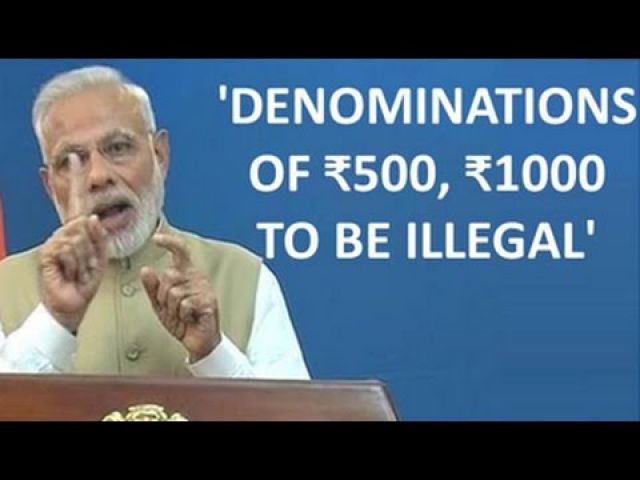
Prime Minister Narendra Modi handpicked a trusted official, minimal known outside India's money related circles, to lead a radical move to abrogate 86 percent of the nation's money overnight and train in on the gigantic shadow economy.
Hasmukh Adhia, the bureaucrat, and five others conscious of the arrangement were promised to the most extreme mystery, say sources with information of the matter. They were bolstered by a youthful group of analysts working in two rooms at Modi's New Delhi habitation, as he plotted his boldest change since coming to power in 2014.
Whenever reported, the abrogation of high-esteem banknotes of 500 and 1,000 rupees came as a rush from the blue. The mystery was gone for defeating the individuals who may benefit from the earlier information, by emptying money into gold, property and different resources and cover up illegal riches.
Already unreported subtle elements of Modi's treatment of the supposed "demonetisation" opens a window onto the hands-on part he played in executing a key approach, and how he was eager to act immediately notwithstanding when the dangers were high. Insufficient substitution notes were imprinted in readiness for the change, and it could take months for things to come back to ordinary. Modi has staked his notoriety and prominence moving.
"I have done all the research and, if it fails, then I am to blame," Modi told a cabinet meeting on 8 November without further ado before the move was reported, by ministers who went to.
Direct line to Modi
Supervising the crusade, with support from the private alcove group stayed outdoors at Modi's sprawling home in the capital, was Adhia, a top finance ministry official.
The 58-year-old served as the main secretary to Modi from 2003-06 when he was the boss clergyman of Gujarat state, setting up a relationship of trust with his supervisor and acquainting him with yoga.
Partners said he had a notoriety for trustworthiness and prudence.
Ada was named revenue secretary in September 2015, reporting formally to Finance Minister Arun Jaitley. In all actuality, he had a direct line to Modi and they would talk in their local Gujarati when they met to examine issues top to bottom.
At a stroke, Modi rejected cash worth 15.4 trillion rupees ($220 billion), equivalent to 86 percent of trade out Asia's third-biggest economy.
"One is never prepared for this sort of interruption - however, it is a valuable disturbance," said Narendra Jadhav, a 31-year veteran and previous boss business analyst of India's national bank who now speaks to Modi's gathering in the upper place of parliament.
Modi, in his TV, deliver to the country, advised that individuals could confront transitory hardship as substitution 500 and 2,000 rupee notes were presented.
Greatest, boldest stride
Instantly after the address, Ada sent a tweet: "This is the greatest and the boldest stride by the Government for containing black cash."
The bag is held back to Modi's race pledge to recuperate dark cash from abroad that had resounded with voters tired of the debasement outrages that tormented the last Congress government. However, in office, he attempted to stay faithful to his obligation.
Over a year, Modi authorized research from authorities at the Finance Ministry, the national bank, and research organizations on the most proficient method to propel his battle against dark cash, a nearby assistant said.
He requested responses to inquiries, for example, How rapidly India could print new banknotes; how to appropriate them; would state banks advantage on the off chance that they got a surge of new stores; and who might pick up from demonetisation?
The themes were separated to keep anybody from joining the dabs and presuming that a trade swap was out the offing. "We would not like to spill the beans," said a senior authority straightforwardly included. "Had individuals got a whiff of the choice, the entire practice would have been unimportant."
Under Adrian's oversight, the group of analysts amassed and demonstrated the discoveries in what was, for it, a hypothetical work out. It was comprised of youthful specialists in information and money related examination; some ran Modi's online networking accounts and a cell phone application that he used to request open input.
However, for all the arranging, Modi and Adhia knew they couldn't predict each outcome, and were ready to move quickly.
Secrecy paramount
The mystery was central, however, pieces of information had been cleared out.
Back in April, analysts at State Bank of India said that demonetization of vast category notes was conceivable.
The Reserve Bank of India, the national bank, likewise revealed in May that it was making arrangements for another arrangement of banknotes that were affirmed in August when it declared it had endorsed a plan for another 2,000 rupee note.
The printing presses had just barely begun turning when the media, at last, began to keep running with the story in late October. "The arrangement was to present it around 18 November, however, there was a reasonable sign that it could get spilled," said one individual with direct information who requested that not be named because of the affectability of the matter.
A few authorities in the Finance Ministry had communicated questions about rejecting high-esteem notes when the thought came up for the talk. They now feel disdain at the mystery in which Adhia smashed through the arrangement on Modi's requests.
Different pundits say the Adhia group fell prey to a type of 'gathering think' that disregarded outside guidance. In the expressions of one previous top authority who has worked at the Finance Ministry and national bank: "They don't have the foggiest idea about what's occurring in this present world."
Tata Steel on Edge for Uk Plant deal
Sensex recovers due to Select Buying Shares
Banks are gearing up to meet the second round of payday rush